Peter MALONE
Saturday, 18 September 2021 19:47
Grownups 2
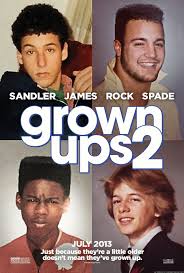
GROWNUPS 2
US, 2013, 91 minutes, Colour.
Adam Sandler, Kevin James, Chris Rock, David Spade, Salma Hayak, Maria Bello, Maya Rudolph, Taylor Lautner.
Directed by Dennis Dugan.
Puerile. That is as good a word as might be found to describe this sequel to Grownups, which was not so good in itself but certainly quite a deal better than this sequel.
This story takes place over one day. It seems to be a collection of skits and episodes dreamed up by Adam Sandler and his co-writers, the continuing story of the family which has come back from Hollywood to their hometown in Connecticut, has settled in even though some of the inhabitants have bad memories from the past. And it is an opportunity for Adam Sandler to hang out with his buddies. Kevin James, Chris Rock are much the same as they were in the first film.
There are a whole lot of pratfall jokes, especially for David Spade, the slightest of the group, who led the beginning of the day by discovering that he has a son he knew nothing off, a huge lug of a boy, rebelling against his father, seeming to indicate some tension in the family. However, once the group of men are confronted by a group of self-important frat boys from a college, the son takes the side of his father and his friends and no family conflict.
Speaking of the frat boys, they are having a holiday on the cliff overlooking the river where everyone in the past jumped into the deep water. This is a lead in for the boys to challenge the men not only to dive, but to dive naked. They do. Later, the men with friends from the town go to the cliff to confront the frat boys and there is an all-in melee.
The film give some attention to each of the characters, relying on the audience friendliness to accept them. However, not much attention is given to their wives who are critical of their husbands though loving them, join together for some chat and gossip, but, it seems, that their role in the film is more of female decoration.
That may seem a little mean-minded, but mean-minded is one of the characteristics of the film: the men are continually slinging off at each other, one-upping each other or associates from the past, wanting to win in any argie-bargie. This gives something of an unpleasant edge to the proceedings.
Grownups! Puerile! While Adam Sandler can be entertaining and clever when he wants to be, especially in a film like Funny People, he is not particularly funny in performance or screenplay this time. That Chris rock does say when confronted by the students, ‘isn’t any one afraid of a black man in America anymore?… Damn you, Obama!’ is a high point. Though that line could have come out of one of his stand-up comic routines rather than just for the film.
Published in Movie Reviews
Published in
Movie Reviews
Tagged under
Saturday, 18 September 2021 19:47
J'Embrace Pas/ I Don't Kiss
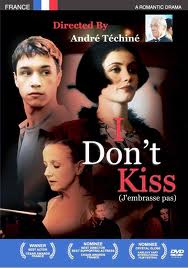
J'EMBRASSE PAS (I DON'T KISS)
France, 1991, 110 minutes, Colour.
Philippe Noiret, Emmanuelle Beart, Manuel Blanc, Helene Vincent, Ivan Desny.
Directed by Andre Techine.
J'Embrasse Pas (I Don't Kiss) is a strong and striking portrait of a young man who leaves his provincial home in the Pyrenees, going to Paris, hoping to become an actor. However, he has had little education, simply wants to get away from home and his oppressive father. He has not made any plans for his life in Paris. After some disillusionment with acting (he has no sensitivity to the plays and has a poor memory), and after working in the kitchen of a hospital, he finally goes on the street as a prostitute.
Manuel Blanc is very good as the young man. Also in the cast is Philippe Noiret as a television compere, a kindly homosexual who nevertheless frequents the street beat. Emanuel Beart (Manon des Sources, La Belle Noiseuse) also portrays a prostitute.
The film fills in very well the hero's background, his farmer brother, his brother in the National Service. It portrays life in Paris, the friendship of the hero with a repressed spinster who cares for her mother, his relationship with fellow workers, with people on the street. It also shows his naivety, the transition from a rather sheltered young man to being comfortable in his life on the streets. However, after he is beaten and raped by the pimp of the young prostitute, he goes to National Service, goes to the sea he has never seen before - and the film ends with his determination to return to Paris much stronger and determined to win in his way of life. The film was directed by Andre Techine (The Bronte Sisters) and has a musical score by veteran Philippe Sarde.
1.The portrait of a young man, the naive young man from the provinces, the journey in early life, the coming of age, the harshness of city life, disillusionment, determination?
2.The Pyrenees locations, Paris, Seville, the countryside, the details of city life? The musical score?
3.The title and its references to Pierre, to Ingrid - and their work, in their own relationship? Prostitutes and their work? The clients, themselves - their control and what they would permit?
4.The structure: Pierre at home, the tense relationship with his family, his mother's grief, visit to his brother, journey to Paris, the experiences, relationships, work, disillusionment? Seville? Patronage? His decision to go on the street? The military service, the ending on the beach? The future?
5.Manuel Blanc as Pierre: age, experience? In the shop, harsh father, grieving mother - and his childlike letters to her? The visit to his brother, giving him the moped? The train journey, the arrival, the taxi being too expensive? Approaching Evelyn and his background as a stretcher-bearer at Lourdes? In the park with her? The hotel, the job and his work at the hospital? Friendship with Said? His decision to be an actor, buying the second-hand book, going to the classes? Not understanding them, Hamlet, memorising the text, the performance and his inabilities, the loss of memory, his not being able to comprehend what was required in acting? The visit to Romain and Dmitri, the talk, his standards and morals, sexuality, homosexuality? Going bowling with Said, the bashing and Said's violence? Seeing Ingrid and her pimp? The meal with Evelyn, the drinking, the return home, her hesitance, the affair? His talking about Hamlet and her disillusionment? Giving him the money? His giving it back to her? The final acting class and people laughing at him? Sleeping on the street and his being robbed? Going to his job, telling lies and being sacked? His attempts at prostitution and failing? Giving his name as Romain? Romain taking him to Seville, the journey, the train, the talk about morality, behaviour, a future? His sudden return to Paris?
6.The world of prostitution, the clients, the money, his becoming wealthy, the bike? Avoiding Romain and hiding from him? The baths? His conditions for his clients?
7.Ingrid and her work, with her pimp, his seeing her, the jail, his going with her, helping her in the jail? Leaving, the breakfast, his sexual impotence? The relationship? The return to the beat, the clash? The pimp, his bashing Pierre, the rape? Ingrid present and grieving?
8.His decision to go to military service, the visit from his brother, concealing the truth from him? Hungry? The decision to go to the army, the discussions with the authority, the tough stances, the training? His never having seen the sea - and his going to the sea? Transition, cleansing, future?
9.His father and his brutality, his mother and her tears, the letters, Pierre's hoping to bring her to Paris? His brother and the farm and the sheep? The brother in the military?
10.The portrait of Evelyn, age, background in Indonesia? Looking after her mother, her mother's severity - the scene in the elevator, taking Pierre to dinner, giving him the room, the sexual experiences? Deceiving her mother? Her being hurt by Pierre's preoccupation with his play? Giving him the money, his returning it? The tense later meeting on the steps of the church?
11.Romain and Dmitri, their relationships, ageing, talk? Romain prowling the streets? Said and his work - and his violence? Romain at Seville, his television work, the interviews? The visit by Pierre? His taking a father figure stance? Pierre rejecting it?
12.Ingrid, her work, the relationship with her pimp, the bowling alley? Her being arrested? Her reaction to Pierre? Her desperation in the jail, demanding to go to the toilet, the refusal? Pierre's help, the meal, the sexual encounter? Pierre's bashing and rape? The pimp and his hold over Ingrid, the henchman?
13.Decisions about life, work? Naivety and experience? The credibility of Pierre's character and his experiences? The film's comment on society?
Published in Movie Reviews
Published in
Movie Reviews
Tagged under
Saturday, 18 September 2021 19:47
Police Story, A Cry for Justice
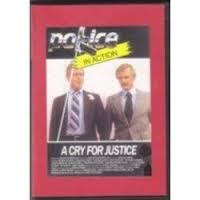
POLICE STORY - A CRY FOR JUSTICE
US, 1979, 100 minutes, Colour.
Dennis Weaver, Robert Culp, Diana Muldaur, Larry Hagman, Sharon Acker.
Directed by Bob Kelljan.
A Cry For Justice is a telemovie well above average. While it covers material in so many police series, it has a very serious tone about the administration of justice, police work, cover-ups, personal ambitions, personal integrity. The film was directed by Bob Ke11jan, noted for his two Count Yorga horror films in the '70s. There is a very strong cast and an excellent performance by Dennis Weaver in the central role of the policeman with integrity. Weaver is always a likable and reliable actor - and this film indicates why. Diana Muldaur has quite a good supporting role as his wife. However, there is an excellent performance by Robert Culp as the ambitious hustling policeman who wants to be always right. It is an excellent counterpoint to Weaver's performance. There are many guest roles, especially one from Larry Hagman as a shady Defence Attorney. The atmosphere of California is well captured and the film is excellently paced and has good serious themes well worth reflecting on.
1. The significance and tone of the title? The focus on police, their work, personalities? The similarity to the material of television series? Police work in its detail, integrity? Systems? The administration of law? The interrelationship of law and justice? The American tone of the film - and the need for personal integrity and honesty?
2. The effectiveness of the film as a telemovie, for home audience and concentration? The colour photography, the editing and the pacing, especially in the opening sequences and segments? The camera on the move, the screenplay and characters on the move? The slowing down for concentration and the detective work and administration of justice? The atmosphere of California: streets, police officers, courts, homes?
3. How strong was the screenplay: the reliance on particular incidents in the opening, dates and places? The focus on the Conrad situation? The transition to Price and his prestige? The solving of the Conrad case and the passing of time? The 18 months difference and the robbery? The re-opening of the investigation, Bentley emerging as the central character, his pursuit of justice and the solution? Audience interest, involvement, reflection? Emotional response to the situation, to Price's attitude, to Bentley's?
4. The build-up of the Conrad situation: the robbers in their car and the drinking, Conrad's coming to them, his suspicions, the shooting? The policeman and his bike and the skid (with the consequences of suspicion of him and his being relegated to Archives?), the pace of the hospital sequences, Conrad's wife and her hysterics (and the irony of the later divorce), Conrad being pressurised by Price to see the films of the criminals in the Colorado prison, the hypnosis sequence with the anxiety of the wife and the disgust of Dr. Burke, Conrad being brought to the line-up and his quick identification of the criminals? His being crippled, still working as a policeman, his wife's divorce? The sequence where he recognised the photos of the true criminals? How well presented was this segment? The portrait of the rookie policeman, his tragedy, the consequences? The need for the record to be set right?
5. The transition to Price - his work with Bentley, the chase amongst the purp1e Christmas trees? The media and his presenting himself modestly but arrogantly? His heavy approach towards Conrad, the film and the interview with the California police, hustling Conrad to the films, pushing the hypnosis and having Bentley there (and Bentley trying to protest, Dr. Burke resenting?), his relentlessness in nailing the criminals? The build-up of his reputation and the joke about 'the Price is right'? The irony of the sequence with his wife and her drinking and their not being able to go out with the Bentleys? His asking Bentley for privacy? The quick talker? The possibility of his being wrong in the Conrad case? His using his quick talking techniques to try to dissuade Bentley, making phone calls over Bentley's head, the interrogation in the prison? His trying to argue Bentley out of the situation in the motel? Shepherd's not having him in for the confession? The irony of the credit and his eagerness to take it? Bentley's suspicions of his own motives towards Price, his ultimate despising him? An accurate portrait of this kind of arrogant man?
6. The contrast with Bentley, the second in the partnership, his assisting Price, the Christmas tree arrest, the presence at the interviews with the police about Conrad, the films, his wariness about the hypnosis, his reaction in discussing it with Jessie? The visit to the Prices and the embarrassment about the alcoholic wife? The contrast with the home sequences with Jessie, his discussing his work with her and his worry about Conrad? His daughter and her birthday? The opportunity for investigating a case and his decision to pursue the Conrad case? The phone calls to the wife of the criminal, the interview at Amoco Oil? His building up the evidence, finding the parking ticket? The interviews with the prisoners and his hostility, his reaction at Price's manner? The visit to the District Attorney and his threats? Rushing in to the judge and his being ticked off but the judge listening to him? The contact with Shepherd, the friendliness between the two men, Shepherd's help? The taping of the confession? The shock of the heavy sentence? The praise for them as a group and its mainly going to Price? His shock and disgust? His continually examining his motives? His explaining to Shepherd his background, ambitions to be a policeman, his seeming to be square, his sense of right and wrong? The American hero with the sense of integrity? His wife affirming that this was what people saw and admired him for?
7. The character of Shepherd - the flamboyant prosecutor-turned-Defence Attorney, wealth, drinking, yacht, meals? His listening to Bentley, his interest in him, his dealing with his clients, his turning Price away, the taping of the confession and his handling of the situation, his praise of Bentley? An interesting guest appearance?
8. Bentley's skill as a detective, his investigation, the phone calls, the building up of the evidence, especially with the traffic ticket?
9. The portrait of the criminals - their drinking and waiting, the shooting of Conrad, their defying Bentley, their willingness to do the deals, the telling of the story? The justice of the heavy sentence?
10. The police chiefs and their attitudes towards the Conrad case, the District Attorney and his arrogance, the judge as a heavy-sent6ncing judge - his reaction against Bentley, finally. agreeing with him?
11. The final freeze frame with Price and Bentley and the audience making their judgment?
12. An interesting view of police work, the administration of law, the need for a sense of justice? The system? Individual policemen and their contribution? The consequences of mistakes? The need to rectify and justice to be seen?
Published in Movie Reviews
Published in
Movie Reviews
Tagged under
Saturday, 18 September 2021 19:47
Thousand and One Nights
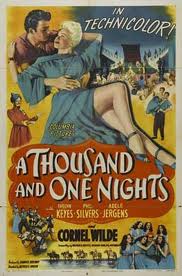
A THOUSAND AND ONE NIGHTS
US, 1945, 89 minutes, Colour.
Cornel Wilde, Evelyn Keyes, Phil Silvers, Adele Jurgens, Rex Ingram, Shelley Winters.
Directed by Alfred E.Green.
1001 Nights is an old-fashioned Arabian adventure - with a comic satiric touch. It indicates the origins of so many of the television series and specials in succeeding decades. The film seems near in spirit to Mel Brooks and his send-ups of the past. This is seen in the introduction, the appearance of Phil Silvers ahead of his time, wearing (like Woody Allen) glasses in the past. He has a lot of corny turns and burlesque jokes culminating in his being dubbed with Frank Sinatra's voice at the end.
Cornel Wilde is hero - the type of film that he did very well. It is reminiscent of his mid-'50s Omar Khayam. Evelyn Keyes enjoys herself as Babs the genie, and Adele Jurgens is the princess. While there are the usual variations on Arabian adventure, The Thief of Bagdad, including Rex Ingram as a genie, and the story of Aladdin and his lamp, the film blends the tongue-in-cheek serious touches of Arabian adventures with very good comedy.
The film is a cinema oddity.
Published in Movie Reviews
Published in
Movie Reviews
Tagged under
Saturday, 18 September 2021 19:47
Tension
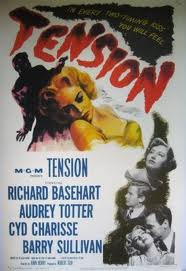
TENSION
US, 1949, 89 minutes, Black and white.
Richard Basehart, Audrey Totter, Cyd Charisse, Barry Sullivan, William Conrad.
Directed by John Berry.
Tension is a small MGM melodrama, touches of film noir. A seemingly meek and mild drugstore manager, played by Richard Basehart, is married to a gold-digging wife who has a reputation, played by Audrey Totter. When she leaves him for a rich man, he is so angry that he begins to develop a murder plan. He takes a new identity, moves to a new apartment block, encounters a very friendly neighbour, played by Cyd Charisse. Barry Sullivan, as the investigating detective, does the narration.
The manager cannot commit the murder at the last moment, but his intended victim is killed. Needless to say, the police suspect the manager but we know that it is his wife who is the killer. She has had a relationship with the detective and he uses her while he diverts attention from her. But, the detective sees through her and brings the investigation to a satisfactory close.
Not bad of its type.
1. An interesting cult crime thriller? Murder mystery? The suspects? The investigation?
2. MGM production, black-and-white photography, the influence of film noir, the influence of such films in the 1940s. Musical score?
3. The title, the detective’s explanation with the tension in the rubber band, applying pressure, stretching until it breaks? His methods with Warren, with Claire?
4. The detective and the voice-over, his introduction to the situation, his character descriptions? Warren, bespectacled, working in the 24-hour pharmacy, his assistant concerned about his welfare? Diligent in his work? Concerned about his wife? Wanting her to be at home, dreading the day she would not be there? Eventually finding it? Knowing who she went off with? The effect on him? Anger? Listening to the stories about murder, murderers not found by the police? His developing the plan?
5. Claire, her past in San Diego, marrying Warren, dissatisfied, taking up with various men, looking at fashion magazines, wanting possessions? Warren and his care about the expensive perfume? The final decision to go, packing? Going off with her friend, at his beach house, Warren visiting, the friend and his beating him up? Her later return, the issue of the dead body, the gun, her answering the questions for the detective, going to the house, identifying Warren as Paul Southern, her plan, despising him, retrieving the gun, bringing it to the apartment, her being tricked by the detective?
6. Warren, his new identity, Mary taking the photo and its later being used to identify him? The friendliness, his awkwardness, his explanations, the landlady, travelling during the week selling perfumes? Actually going back to the pharmacy? Attracted to Mary, her character, pleasant, attracted to him, going out, the discussions?
7. The murder, the search for Paul Southern, no records of him, Mary and her enquiries for a lost person, the detectives working on the information, arresting Warren, grilling him, the detective’s assistant and his nonchalant attitude?
8. Letting Warren go, going to the apartment and drinking with Claire, her getting the gun, planting it, the detective saying the furniture had been changed?
9. Satisfactory resolution, and a romantic happy ending.?
Published in Movie Reviews
Published in
Movie Reviews
Tagged under
Saturday, 18 September 2021 19:47
Thirty Nine Steps, The/ 1960

THE THIRTY-NINE STEPS
UK, 1960, 93 minutes, Colour.
Kenneth More, Taina Elg, Barry Jones, Faith Brook, Brenda de Banzie, Duncan Lamont, James Hayter, Michael
Goodliffe, Reginald Beckwith.
Directed by Ralph Thomas.
The Thirty - Nine Steps is the second version of John Buchan's famous novel about Secret Service agent Richard Hannay. The first film was the Hitchcock classic of 1935 with Robert Donat, Madeleine Carroll, Godfrey Tearle, Peggy Ashcroft and John Laurie. There was to be a remake in the late '70s with Robert Powell as the hero and a supporting cast including John Mills. This latter film was a return to the structure and style of the original novel. But the remake of 1959, an adaptation by Frank Harvey, was based more on the Hitchcock film than on Buchan's novel.
The remake was an updating of the action to a contemporary England. There was attractive colour photography and some special effects for action sequences. The film was a production of the very popular Betty E. Box and Ralph Thomas combination (the Doctor series, many dramas starring Dirk Bogarde). The film also takes its tone from having Kenneth More in the lead - a much more genial actor than either Robert Donat or Robert Powell. The supporting cast is very strong and very effective. Barry Jones is an eccentric villain, James Hayter a delightful Mr. Memory and Brenda de Banzie and Reginald Beckwith are the couple, Peggy Ashcroft and John Laurie in the original film. Taina Elg was not a strong heroine.
This film, as with the original, relies on an atmosphere of suspense, the focusing on the character of Richard Hannay and his mysterious adventures - with many London Hitchcock touches including the death of the nanny. There is the famous train sequence with the unwilling heroine. There are the chases in Scotland and the finale in the theatre with Mr. Memory giving the secrets. While the film lacks the cinematic style of Hitchcock's original, this version is a very entertaining action spy adventure.
1. The appeal of this classic story? The plot, issues, hero, adventures, patriotism, types?
2. The influence of the film tradition? Hitchcock and his classic treatment of the 'thirties? The remake of the 'fifties? The highlights and their inclusion or non-inclusion? e.g. the farm sequence in Hitchcock's version, Mister Memory? The contribution of the 'Big Ben' climax in this film?
3. The title, its illustration during the credits? The code meaning? Tone, expectations, adventure?
4. The importance of atmosphere for this version? Colour, London and England in 1914, Parliament, Big Ben, the streets and houses of London, the countryside, by train and car and air? Scotland? The Big Ben and Thames climax? The delight in nostalgia and re-creating the period? An authentic atmosphere for this kind of story? The contribution of the score and its atmosphere?
5. The political background: the Prussians and their infiltration in England, England and its preparation for the war? Scutter and his investigations and warnings, the sleepers awaking, the assassinations? Appleton and his infiltration? The assassins and their acceptance in society and adapting to England? The impact of these stories of World War One and 1914 in the late 'seventies? Historical interest?
6. Scutter and his impact, the opening, his pursuit especially after the assassinations? His anxiety, packing, decision to go to Hannay? Telling his story, the gun, Kate sleeping, escaping death? The empty gun? Posting the notebook? The suddenness of his death? The nuns screaming? His continued presence throughout the film and the importance of his notebook?
7. Hannay as hero? Robert Powell's style and presence? South African background -mines, English, German? The decision to go to Scotland? Providing a situation for adventure? His apprehension of the various clues? Sheltering Scutter and emptying the gun? Being present at his death? The implications and accusations? The continued escaping?
8. The presence of the police, the interrogation, the pursuit? The aspects of the manhunt presented? The proving of the innocence but the decision to make out that he was still being pursued? The role of the police in defusing the bomb? The character of the Inspector?
9. The background of the politicians and the issues of war? The substitution of a pier and the repercussions especially for Navy, Army, Intelligence?
10. The confrontation of Hannay and Appleton? The character of Appleton and his presence in England, his decisions, his influence over the two assassins? Audience response to his stabbing the politician in the street? The spectacular kidnapping of Hannay, the interrogation and imprisonment, letting him escape, the incidents at the railway station?
11. Hannay's ingenuity in escaping, taking the place of the parson, escape in the train and pulling the cord, hiding on the bridge, the pursuit over the fields? His background of hunting in Africa? The tramp and his clothes? The assassination of the gamekeeper? The continued moving through the fields?
12. The introduction of the shooting party, Hannay telling his story, the fascination of Miss Mackenzie and the romantic interest? Her engagement to David? His continued help? The escape, the bicycle ride and the plane pursuit, the political rally and his double talk, the presence of the assassins? The return to the house and David's death? The sanatorium scenes and his inability, summoning the attendant, the wheelchair incident?
13. Appleton and his presence at the sanatorium ? The lengths to which he would go?
14. Hannay helping the Inspector? The decoder, the thirty-nine steps? The kidnapping of the politician and Miss Mackenzie, the elements of time?
15. The build-up to the Big Ben sequence - the political situation, the constant focus on the time. Big Ben itself, Hannay's decision to confront the assassins, his understanding what was going on, going out on Big Ben and holding the hand? How far-fetched, how authentic? The people watching and the audience sharing this? The fights, deaths, the rescue of Hannay?
16. The rescue of Miss Mackenzie and the politician - England saved?
17. Characters developed for this kind of action adventure, British types, tradition and the traditional presentation, patriotic values - and their perennial appeal?
Published in Movie Reviews
Published in
Movie Reviews
Tagged under
Saturday, 18 September 2021 19:47
Phil Spector
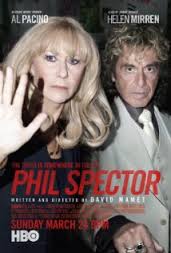
PHIL SPECTOR
US, 2013, 92 minutes, Colour.
Al Pacino, Helen Mirren, Jeffrey Tambor, Chiwitel Ejiofor, Rebecca Pidgeon, James Tolkan, Matt Malloy.
Directed by David Mamet.
Phil Spector was written and directed by eminent playwright, David Mamet. Mamet states that, while the film is based on actual characters, it is not a true story. Rather, it is a reconstruction of events, looking at evidence, offering a favorable interpretation for Spector.
The film is brief, just over an hour and a half. It focuses on the period when Spector was first on trial, with verbal flashbacks to what happened, or not.
There are discussions, speculations, the reconstruction of a skull and a blood test for the spray from the bullet, a test with a gun and the mouth and the pulling of the trigger and its a sudden sound.
Al Pacino, as might be expected, gives an intense performance as Spector, capitalizing on his self-absorbed and aggressive personality, the vanity in his reputation as influencing the American music industry and beyond, the eccentric clothing, the choice of wigs. He is matched by Helen Mirren as the tough lawyer brought in to defend Spector. There are some fine intense scenes in their discussions together. The supporting cast includes Jeffrey Tambor as the lawyer hired by Spector, Chiwitel Ejiofor, and Mamet’s wife who has appeared in many of his films, Rebecca Pidgeon, who also sings the song during the final credits.
Just as Spector divided opinion and raced protests in real life, the film would do the same.
1. Audience knowledge of Phil Spector and his role in the music industry, over many decades? The story of the death of Lana Clarkson? His music skills? Promotion? His life? His eccentric and erratic personality?
2. The death of Lana Clarkson, the story, the stories? Opinions, protestors? The court case, hung jury, the evidence? The second case? In prison?
3. HBO and production values? His mansion, the interiors? Legal offices? The rehearsal room? The court? The musical score and songs? Illustrating Spector’s career?
4. Al Pacino and his performance? Look, manner, speaking, eccentric, melodramatic, the wigs and the clothes? The impressions he made? Self-absorbed? Guilty or not?
5. The director’s perspective, not a true story but based on actual characters? Guilty or not guilty?
6. David Mamet, as playwright, as director, screenwriter? His interest in the drama? The quality of his writing and characterize action? His interpretation?
7. Linda, Helen Mirren’s presence and performance? Her character, knowledge of the law, skills? Having the flu and this theme influencing her decisions and behavior? The prospect of the holiday in Venice? Going to the office, Tambor and the others, listening, taking the job?
8. The meetings, the discussions, in Spector’s house, her reaction, her wanting the truth? Her assessment of Spector was character? The way he treated her? Her reconstructing the episode, the various possibilities and the story, Spector and women, the break-up of his marriage and his harsh attitude towards the screening of his wife’s comments? Taking Lana Clarkson home, a desire for fame, the audience seeing her audition tape? Reconstructing what happened? Spector finding her? The chauffeur and his evidence? Spector’ reaction?
9. Spector and the music, playing the records, the Beatles, his treatment of them and Linda’s questions? The articles, his vanity?
10. Asking for Tambor, relying on his skills? The high price for his services? Linda’s demands? His going to New York, being absent? Spector complaining, his outburst, Linda reminding him of the public agreement in court?
11. The issue of the blood, the splashing on Spector’s clothes? The reconstruction of the skull, the trajectory of the bullet, the flow of the blood? The visual reconstruction and test? Whether to use it or not in evidence?
12. The gun test, the girl and her participating in the experiment, the gun in her mouth, the shout, pulling the trigger? Possible evidence?
13. Linda, the assistant, their research, the chauffeur, the testimony of Spector’s wife? His vitriolic response?
14. The set up for the rehearsal, Spector agreeing? The performers? The intensity, the judge, the prosecution, the attack, his vigorous outburst, eventually coming down, his apology?
15. The trial, his arriving late, his look, the wig and his explanation, Linda’s reaction, the judge? The jury?
16. The doctor, priming him for his testimony, the percentages, his nervousness, his vanity, his being called to the witness stand?
17. The final information, the hung jury, the retrial, Spector found guilty?
18. The value of this kind of film, probing a public figure, looking at the evidence about his guilt, reconstructing possibilities of innocence?
Published in Movie Reviews
Published in
Movie Reviews
Tagged under
Saturday, 18 September 2021 19:47
Big Ass Spider!
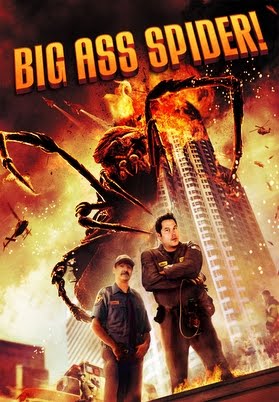
BIG ASS SPIDER
US, 2013, 80 minutes, Colour.
Greg Grunberg, Lomabardo Boyar, Clare Kramer, Ray Wise, Lin Shaye, Patrick Bauchau.
Directed by Mike Mendez.
You may not want to be seen walking into Big Ass Spider. Apart from the use of the word, Ass, who wants to be seen going into one of those old-fashioned animal menace, spider-menace, films from the 1950s and 60s? Well, rest assured that if you are a fan of this kind of film, you won’t be disappointed. Of its kind, it is very enjoyable and rather well done.
The film is something of a homage to those old movies like Tarantula… But, it is also something of a spoof, a pleasing parody of the conventions of this kind of film. And, it is blessed with dialogue which is a good blend of the witty and the deadpan, as well as conventional characters who are cardboard in their way, but do have a bit more life than the usual. Some have complained of the artificiality of the special effects – however, these are done quite well, and what do you expect in this kind of B-budget spoof?
The central character is a good-natured post-exterminator (Greg Grunberg) whom we see in action, helping literally clinging old lady to get rid of her mouse and paid, as always, with fruitcake! But he is bitten by a spider and goes to hospital where he encounters a dire situation, a morgue attendant bitten by a spider and physically deteriorating. Our hero volunteers to examine the situation and gets the help of the Hispanic security guard (Lombardo Boyar), who provides a lot of the verbal humour and deadpan reactions. They are a kind of odd couple, a contemporary B-budget movie Don Quixote and Sancho Panza.
Then the army arrives, ultra-serious. An experiment (as always!) has gone wrong. The scientist is there to help out but with his wordy explanations, he gets in the way and is ousted. There is also a very efficient woman officer who seems, at the beginning, an unlikely romantic contact – but, of course,…
The film is not particularly gory, but has enough jumps, shocks, grimace-making sequences that are not overly disturbing for any audience. The spider keeps on quadrupling itself and eventually finishes up, like King Kong in New York, straddling a skyscraper in Los Angeles.
The film has received distribution in horror festivals and Monsterfest screenings. As far as it goes, it is a pretty good example of this kind of enjoyably exploitative creature film.
1. Expectations? The title, the tone? Serious/spoof?
2. The tradition of spider and animal menace films, animal attack, science and mutations? Audience response? Military? Individual heroes? How did this 21st century spider film draw on these traditions? Pay homage? Utilise them? Spoof?
3. The director, his editing the film, pace? The story, the flashbacks, the fear, the explanations, the build-up, shocks, confrontations and dangers, heroics?
4. The screenplay, judging well between the serious and the comic, the issue, the characters, the hero and his sidekick, the romantic element, the combination of these, the visual jokes, the one-liners, satire, larger-than-life?
5. Alex, at the start, stunned, his face, the crowds fleeing, the giant spider, on the building?
6. Alex as a character, exterminator, going to the old lady, her clinging to him, payment in fruit cake? His being bitten? Going to the hospital, flirting with the nurse, her blunt rebuffs?
7. The morgue, the attendant, the corpse, moving under the sheet, the bite? The manager trying to control the situation? Alex, his bill, offering to confront the situation?
8. Alex and his meeting Jose, security, the Mexican, his use of language, not understanding every word? The banter between the two? Alex going into the roof?
9. The arrival of the military, the takeover, the officer in command at his seriousness, Karly and her being the assistant, Alex and the attraction?
10. The military and the screens, visualising the attacks, the weaponry available?
11. The scientist, old, with the military, his long explanation and the reaction of Alex and Jose, the quadrupling of the spider, the various stages, reproduction?
12. The spider and its growth, prowling the hospital, killing the patient in his room and his attempts to save himself, its moving out, going to the park, the old man looking up into the tree, all the picnickers, the pursuit, the web and cocooning the victims, devouring them? The deadpan presentation of this news on the television, the anchors, the commentary?
13. The invasion of Los Angeles? Alex and Jose, links with the military, being put off, Karly and her being saved in the woods, the military getting rid of the scientist, the truth of the situation, Alex and his determination, the pursuit, the destruction of their van?
14. In the city, Karly being taken, in the upper storey, the pods, the birth of the spiders?
15. Alex, the plann with Jose, the weaponry, going up in the lift, the attack, freeing the people, freeing Karly?
16. Facing the spider, its fall from the top of the building, crashing into the street, seemingly dead? The military self-congratulations? Alex and his happiness?
17. The spider reviving, Jose with the rocket, Alex firing it into the spider, destruction? The happy ending, romantic?
18. The phone call about the size of a cockroach? The playing of La Cucuracha?
Published in Movie Reviews
Published in
Movie Reviews
Tagged under
Saturday, 18 September 2021 19:47
Jackass Presents: Bad Grandpa
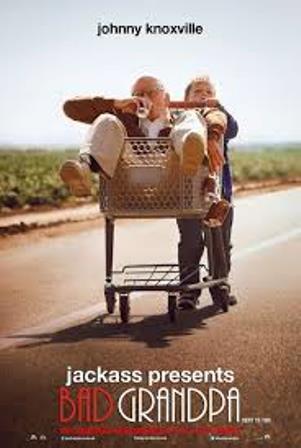
JACKASS PRESENTS: BAD GRANDPA
US, 2013, 92 minutes, Colour.
Johnny Knoxville, Jackson Nicoll.
Directed by Jeffrey Tremaine.
When a movie announces Jackass Presents, it is either a hearty welcome or a dreaded beware!
With the television series and with three movies, the last one in 3-D, diehard Jackass fans know what to expect. The unwary stumbling upon Jackass movies may well be very wary the next time.
What the Jackass movies present is a collection of what might at best be called “pranks” or, at worst, “idiotic death-wish stunts”.
However, what we have here, is closer to pranks than the accustomed stunts, though there are a few of these with the warning at the end, as always, that they have been contrived for the film and should not be tried at home.
Also this time is a semblance of a plot, a young woman is about to go to jail and leaves her eight-year-old son with her father, with the instructions to take him across the country and give him to his father. Actually, underlying all the pranks and the stupidities, there is a strong vein of sentiment – although grandpa is certainly hard to warm to and his grandson seems far too knowing and precocious, entering into all the pranks wholeheartedly.
Grandpa is played by Johnny Knoxville who is the foundation for the Jackass movies. Billy is played by Jackson Nicoll whom Knoxville met when they were acting together in the rather unfunny, Fun Size (where Nicoll played a rather creepy character).
As the couple across the country, they encounter all kinds of people, and test their reactions to some outrageous comments and behaviour. Then we realise that what the film is is really a Candid Camera kind of movie, setting up people in situations so that they react for the hidden camera. To be fair to the film and the victims, there are closing credits sequences where the audience sees how the cameras are set up and how people react – and all those who unwittingly participated are all listed as appearing as themselves.
Most of the jackass movies are “no holds barred”. But this film does not go to those extremes. Yet there are some very tacky and crass situations, some gross-out bodily function sequences and a lengthy one with (how can one put it?), genital prosthetics.
There is a huge audience for this kind of jokey film, a blokey kind of audience, a very extroverted kind of audience who relish this kind of humorous embarrassment. And it made $90 million at the American box office in its first two weeks!
Note: for those who want to see more and see some of the Making of..., check out the outtakes and interviews in Jackass Presents: Bad Grandpa.5.
Published in Movie Reviews
Published in
Movie Reviews
Tagged under
Saturday, 18 September 2021 19:47
Insidious: Chapter 2

INSIDIOUS CHAPTER 2
US, 2013, 104 minutes, Colour.
Patrick Wilson, Rose Byrne, Ty Simpkins, Lynne Shay, Leigh Whanell, Angus Sampson, Barbara Hershey.
Directed by James Wan.
Insidious was very popular with audiences on its first release, exceeding box-office expectations. After all, there have been many haunted house thrillers and many ghost horror stories. Here was another one. But it had a good cast, was well written, created its eerie atmosphere, invented a few alternatives to going into the land of forgiveness and the afterlife, called The Further.
What can filmmakers do except to make a sequel! They have capitalised on what was successful in the first film and offered some variations and similar repetitions. And this film has been successful as well.
Insidious: Chapter 2 was written by Australian Leigh Whannel who wrote the first film (and wrote the first in the Saw series) as well as the first Insidious. The film was directed by James Wan who directed Saw and Insidious – and had great success, critical and box-office, in 2013 with his exorcism film, The Conjuring. And the star also comes from Australia, Rose Byrne.
However, this is a very American film, a film about a family, with grandmother (Barbara Hershey), parents (Patrick Wilson and Rose Byrne) and three children, capitalising on the bonds between them all. It is also haunted house story, the audience being taken back at the opening to 1986 and some experts trying to help a mother who has a haunted child. This was the house of the grandmother and the proceedings had an influence on the father of the family who, in the initial film, was taken into The Further. This time we wonder whether he actually returned or whether he was possessed by a sinister Bride in Black from the past. This sets up the new hauntings, bizarre behaviour by the father, and the self-sacrifice of the son, who previously saved his father, to do it again.
Entertaining in its way, not one of the classics, but a respectable contribution to the genre.
1. The popularity of the original film? The story of ghosts, haunted house, The Further?
2. The plot of this sequel, drawing on the first, variations on the first? Hauntings, ghosts, going into The Further, the rescue? The vanquishing of the Bride In Black?
3. The family and this story, Josh’s family house, the present house, the hauntings, within the house or within the persons? Persons being taken over by sinister beings? The experiences, the explanations?
4. The return to 1986? The house, Carl and Elise going to help with Parker, his mother’s concern? Elise as fearless, Carl doing the recordings? the boy sitting in a chair, being filmed? The sinister presence of the woman? Elise and search, Parker advising her warm or cold? A confrontation with the Bride in Black, the scratch, her return?
5. The present, the presuppositions, the family home, finding Elise dead in the chair? Renai and the children, the birth of Kelly, concern about her? Josh and his reassuring her that she should not show fear and the evil presence would go? Kelly, the disappearance, the mysterious playing of the piano? Renai and the interview by the detective? Her fears, suspicious of Josh, wondering whether he killed Elise? The reliance on Lorraine?
6. Lorraine, her having the two come to the house, the search, the filming? Carl and his presence? The older Carl? The dice, the word, death, the room of the dead? The exploration, finding little girl, the sinister presence?
7. The dangers for Renai, the babysitter with the boys, her sending them away for their safety, with Lorraine, the escape? The phone call, the return? Josh and his being possessed, his violence towards Renai, chasing her to the basement, her locking the doors? Carl and the dice?
8. Dalton, his place in the family, the vividness of his nightmares, the ghosts approaching to destroy him? His younger brother? His hitting his father to save his mother? Volunteering to go into The Further? The old tins and string phone, taking them into The Further? Finding his father and the others?
9. Carl, his coming to interview Josh, the glass of water, the dice indicating the knife behind Josh’s back, Josh’s attack on him, he is going into The
Further? Meeting Elise, meeting the real Josh, the search, the reliance on memories, of the old house, the flashbacks, the little girl on the bed, it’s being Parker, the mother wanting him to identify as a girl, called Marilyn? His decision to guide them? The room with the 15 victims? The build-up to the confrontation? The death of the false Josh? Their coming out of The Further?
10. The reconciliation? The happy ending? The destruction of the Bride in Black?
11. The tongue-in-cheek ending with the phone call and the group going to the house to see the possessed young woman?
Published in Movie Reviews
Published in
Movie Reviews
Tagged under